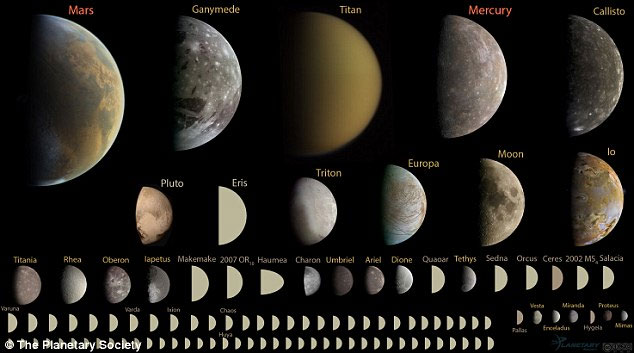The solar system has ... 110 planets?
The Solar System's ninth planet can be reborn and dragged along with more than 100 other friends, thanks to a new definition that refutes the definition of "downgraded" Pluto in 2006.
The new publication, headed by Central Florida University (USA), looked at data from more than 200 previous studies and countless of the latest data in human space exploration, showing many holes. gap in the "planetary" definition of the International Astronomical Union (IAU) in 2006.

There will be many celestial bodies in the Solar System that are recognized as a planet if this new definition applies - (photo: THE PLANETARY SOCIETY).
The IAU's definition in 2006 caused a major change in the human view of the Solar System and was controversial: arguing that Pluto, the previous object, was always regarded as the Solar System's ninth planet. Not a sufficiently standard planet. Since then, the Solar System has been regarded as only 8 planets.
Planetary scientist Philip Metzger, of the Florida Space Institute (member of Central Florida University), who has worked for many years at NASA, points out the inadequacy of Pluto "downgrade" judgment. : It is based only on a publication from 1802, and this ancient publication is based on unproven reasons.
The new study suggests that the definition of a "planet" should be built on its sustainable internal properties and reject the definition based on the changeable properties used by the IAU, for example. like trajectory motivation.
Accordingly, Philip Metzger said a celestial body should be called a planet if it is big enough for its gravity to allow it to be a stable, prerequisite sphere that can evolve with activity. Complex geological dynamics.
The team analyzed the case of Pluto: its geological activity is even more vivid than Mars. In the whole Solar System, only Earth has that more complex geological activity. Pluto also possesses all the things that a planet could have like an underground ocean, a multistory atmosphere, organic compounds, evidence of ancient lakes, many Moon's around .

Pluto is the second most complex geologic object in the Solar System, just behind the Earth - (photo: ALAMY STOCK PHOTO).
According to this new definition, there will be about 110 objects in the Solar System that meet the planet's standards, including a number of previously viewed objects like dwarf planets and moons, including our moon, some faces The famous moon of Jupiter, Saturn is considered the "promised land" of the search for space life, dwarf planet Ceres, Charon .
Metzger further asserted that IAU's statement was negligent, while co-author Kirby Runyon said the 2006 statement was "a false historical statement".
The research team said their definition captures common knowledge that has long been present in the planetary science community. Recent insights show us that there are quite a number of celestial bodies in the Solar System that have similar properties to Earth, including water and organic materials, even though it is only regarded as a moon.
- Unknown mystery about planets outside the solar system
- Discover more than 700 planets outside the solar system
- Planets in the Solar System
- The distance from the Earth to the celestial bodies in the solar system
- Space Science: The order of 8 (or 9) planets in the Solar System
- NASA announces a map of 4,000 planets outside the Solar System
- Latest images of 7 planets in the Solar System version 2.0
- Discover the oldest solar system outside the solar system
- Detection of the Solar System may contain Earth-like planets
- How the plane took off on the solar system planets
- Our solar system in the galaxy is rare
- Discovered the twin version of the solar system
 Van Allen's belt and evidence that the Apollo 11 mission to the Moon was myth
Van Allen's belt and evidence that the Apollo 11 mission to the Moon was myth The levels of civilization in the universe (Kardashev scale)
The levels of civilization in the universe (Kardashev scale) Today Mars, the sun and the Earth are aligned
Today Mars, the sun and the Earth are aligned The Amazon owner announced a secret plan to build a space base for thousands of people
The Amazon owner announced a secret plan to build a space base for thousands of people